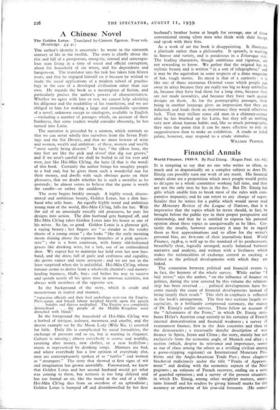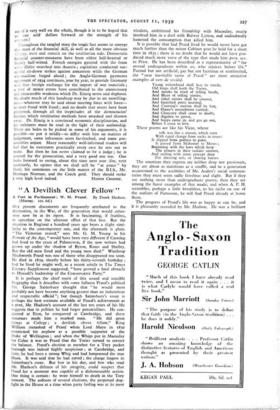Financial Annals
World Finance, 1938-9. By Paul Einzig. (Kegan Paul. 125. 6d.)
IT is tempting to say that no one who writes so often, so much and so dogmatically on a complex subject as does Dr. Einzig can possibly turn out work of any merit. His financial annals alone are a proposition which most people would prefer to delegate to a whole committee working full time, and they are not the only iron he has in the fire. But Dr. Einzig has gifts which enable him to break most of the rules with com- parative impunity; and he can retort to any charge of super- ficiality that he writes for a public which would never read the Monetary Review of the League of Nations, that it is imperative that the topics which he treats should, in fact, be brought before the public eye in their proper perspective and relationship, and that he is entitled to express his personal opinion about these topics as unequivocally as he likes. Cer- tainly the results, however necessary it may be to regard them as first approximations and to allow for the writer's personal bias, are first-rate of their journalistic kind. World Finance, 1938-9, is well up to the standard of its predecessors; beautifully clear, logically arranged, neatly balanced between narrative and analysis, and written with a liveliness which makes the technicalities of exchange control as exciting a subject as the political developments with which they are linked.
The connexion between political and financial events is, in fact, the keynote of the whole survey. While earlier "I laid stress," says the author, "on the influence of finance on politics, during the year covered by this volume the relation- ship has been reversed . . . political developments have be- come mainly the cause of financial developments instead of being largely their result." This shift in emphasis is reflected in the book's arrangement. The first two sections largely re- capitulate, in a brilliantly compressed summary, the matter of Dr. Einzig's earlier surveys. There follow an account of the "Adventures of the Franc," in which Dr. Einzig attri- butes Hitler's Austrian coup entirely to his certainty of French internal demoralisation and financial weakness ; a survey of rearmament finance, first in the Axis countries and then in the democracies ; a necessarily sketchy description of war finance in Spain, Japan and China ; the story, mainly but not exclusively from the economic angle, of Munich and after ; a section (which, despite its relevance and importance, seems as out of place among the others as a strolling civilian among a goose-stepping regiment) on International Monetary Pro- blems and the Anglo-American Trade Pact ; three chapters bracketed maliciously under the title "Fruits of Appease- ment" and dealing with the economic aspects of the Nazi pogroms ; an estimate of French recovery, ending on a note of guarded optimism ; and a survey of the present situation, in which Dr. Einzig, among other weightier matters, enter- tains himself and his readers by giving himself marks for the accuracy or otherwise of his year-old forecasts. (He comes
out of it very well on the whole, though it is to be hoped that lac one sold dollars forward on the strength of his e.a. nate.) "Ihroughout the tangled story the tragic fact seems to emerge ea..: most of the financial skill, is well as all the more obvious .:fly, were and remain on the totalitarian side. Democratic financial counter-measures have been either half-hearted or frankly half-witted. French energies gyrated with the franc e Hitler marched into Austria ; capitalists conducted suc- ces,ful sit-down strikes against armament while the German war-machine forged ahead ; the Anglo-German payments agreement of 1934 continues, year by year, to provide Germany %;.;:t free foreign exchange for the import of war materials ; a host of minor errors have contributed to the unnecessary and inexcusable weakness which Dr. Einzig notes and deplores. No doubt much of this handicap may be due to an unwilling- ness—whatever may be said about meeting force with force— To meet fraud with fraud ; and no doubt that assets have been preserved, through all the ineptitudes of the democracies' finance, which totalitarian methods have smashed and thrown away. Dr. Einzig is a convinced economic disciplinarian, and his strictures must be read in the light of their authorship. There are holes to be picked in some of his arguments, it is possible—to put it mildly—to differ with him on matters of judgement, some inferences seem far-fetched, and some per- sonalities unjust. Many reasonably well-informed readers will feel that he overstates practically every case he sets out to make. But then he has never claimed to be a judge ; he is counsel for the prosecution, and a very good one too. One looks forward to seeing, about this time next year (for, very cautiously, he opines that we shall still be "at peace" by then), his comments on the little matter of the B.I.S., Mr. Montagu Norman, and the Czech gold. They should strike









































 Previous page
Previous page